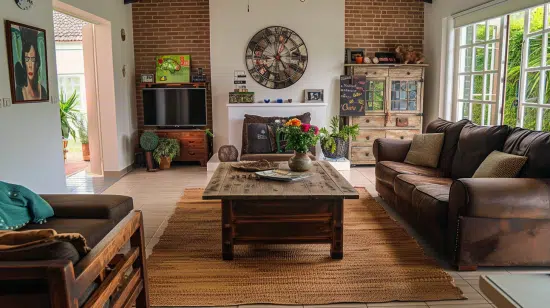Why a Smaller House Can Be a Smart Decision for a Family of Three
Choosing the right house size for your family can feel like a major hurdle when deciding on a floor plan or house design for your dream home.
Look:
I get it…
On one side, the allure of a spacious 5-bedroom house might tug at your desires, promising ample space for guests and future-proofing. On the other, a cozy 3-bedroom home beckons with its promise of simplicity and ease.
For a family of three, the decision might seem daunting, but here’s the deal: opting for a smaller house can be a smarter, more practical choice.
Let’s get into why a snug 3-bedroom home could be the perfect fit for your family and how it can offer comfort, financial savings, and environmental benefits.

What are your actual needs?
Before getting into the specifics, it’s crucial to assess your actual needs versus your desires. For most clients I’ve spoken to, after assessing their needs, the size of the home they need almost instantly becomes clear.
Here’s what you need to do:
Consider Your Daily Routine
Think about your daily routine and how you use your current living space. Do you really need extra rooms that will only be occupied occasionally? A smaller house can often provide sufficient space for a family of three without the unnecessary upkeep of extra rooms.
Future Planning
Yes, it’s wise to plan for the future, but overestimating your needs can lead to unnecessary expenses. Will you be hosting guests often enough to justify the additional rooms? Could those guests be accommodated in other ways, such as a pull-out couch or an air mattress?
Financial Implications
Money matters, and choosing the right house size can significantly impact your finances.
Lower Purchase Price
A smaller house typically comes with a lower purchase price, which can mean a smaller mortgage and lower monthly payments. This can free up funds for other essential needs or savings.
Reduced Utility Costs
A larger home usually incurs higher utility costs. Heating, cooling, and lighting more space can lead to significantly higher energy bills. A smaller home is not only more energy-efficient but also environmentally friendly.
Maintenance and Upkeep
Maintaining a larger house requires more time and money. From cleaning to repairs, the upkeep can be overwhelming. A smaller home is easier to manage and maintain, allowing you to enjoy more free time and fewer stressors.
Lifestyle and Comfort

Living comfortably is about more than just the number of rooms.
Coziness and Intimacy
Smaller homes often foster a closer family environment. Shared spaces encourage more interaction and bonding, which can be especially beneficial for families with children.
Easier to Personalize
A smaller space can be easier to decorate and personalize. You can focus on quality over quantity when it comes to furniture and decor, creating a cozy and stylish home that truly reflects your family’s personality.
Stress Reduction
Living in a home that’s too large can sometimes feel overwhelming. More rooms mean more clutter and more places to clean. A smaller home can promote a minimalist lifestyle, reducing stress and promoting a sense of order.
Practicality in Hosting Guests

Hosting guests is a common consideration, but it’s essential to evaluate the practicality of this need.
Frequency of Guests
How often do you realistically expect to host guests? If it’s only a few times a year, it might not be worth the extra expense and effort of maintaining additional rooms.
Alternative Arrangements
There are many creative solutions for hosting guests without needing extra bedrooms. Consider multifunctional furniture like sofa beds, or transforming an office or playroom into a guest room when needed.
Airbnb and Short-Term Rentals
For infrequent but extended visits, renting a nearby Airbnb or short-term rental can be a practical solution. This way, guests have their own space, and you avoid the burden of maintaining extra rooms year-round.

Environmental Considerations
Smaller homes are not only cost-effective but also environmentally friendly.
Energy Efficiency
Smaller homes consume less energy, which means a smaller carbon footprint. In an era of importantenvironmental consciousness, living in a smaller, more efficient home is a responsible choice.
Sustainable Living
Choosing a smaller home can encourage more sustainable living practices. It promotes the use of fewer resources and reduces waste, aligning with a growing emphasis on sustainability.
Real-Life Client Story – The Johnson Family
To illustrate, let’s consider the Johnson family’s experience. The Johnsons were a family of three, much like yours, debating between a large 5-bedroom house and a cozy 3-bedroom home. Initially, they were drawn to the idea of extra space for guests and future growth.
However, after some deliberation, they chose the smaller home. This decision was driven by their desire for a simpler, more manageable lifestyle. They found that the 3-bedroom home met all their needs without the burden of additional space.
They could still host guests comfortably with a versatile living room that doubled as a guest area. Financially, they saved significantly, allowing them to invest in family vacations and educational pursuits for their child.
The Johnsons’ choice ultimately led to a happier, more cohesive family life, demonstrating that bigger isn’t always better.
Addressing Common Concerns
What if We Need More Space in the Future?
Flexibility is key. If your family grows or your needs change, there are always options like renovations or extensions. Planning for potential changes without overcommitting to unnecessary space upfront can be a balanced approach.
Will a Smaller Home Affect Our Resale Value?
Not necessarily. Smaller homes can be highly desirable, especially in urban areas where space is at a premium. Many buyers are also looking for manageable homes with lower running costs. The resale value depends on various factors, including location, condition, and market trends.
How Can We Maximize Space in a Smaller Home?
Smart Storage Solutions
Utilize built-in storage options and multifunctional furniture to make the most of your space. Vertical storage and under-bed drawers can help keep things organized without taking up extra room.
Open-Plan Design
An open-plan layout can make a smaller home feel larger and more connected. Combining the kitchen, dining, and living areas can create a spacious feel without additional square footage.
Outdoor Spaces
Make the most of outdoor areas like patios or gardens to extend your living space. These areas can serve as additional entertainment spaces without the need for extra indoor rooms.
Final Thoughts
Choosing the right house size is a deeply personal decision that depends on your family’s specific needs and lifestyle. While a larger home might seem appealing for the occasional guest or future planning, a smaller, more manageable home can offer numerous benefits in terms of cost, maintenance, and overall quality of life.
So, next time you find yourself weighing the options, consider the numerous advantages of opting for a smaller, cozier home. It just might be the perfect fit for your family.
